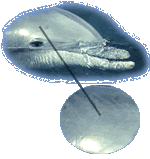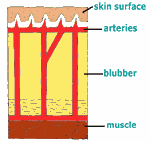 |
  Structure of the Skin
Structure of the Skin(Click for larger version)  Cross-sectional Diagram of the Skin
Cross-sectional Diagram of the Skin(Click for larger version) Go to: |
SkinA dolphin has extremely smooth, firm and velvety skin, which helps them to slip through water with apparent ease. Water resistance is greatly reduced and this effect, together with the body's streamlining and the power of the flukes, allow the dolphin to swim at high speeds. The dolphin's smooth skin is constantly being sloughed off and replaced. It is also very sensitive to touch, and easily scarred. Almost all adult dolphins have numerous scars, nicks and notches on their skin and these help researchers to identify and study their interaction with companions, enemies and the environment. Unlike most other land mammals, dolphins do not have thick coats of hair to keep their bodies warm although new-born calves sometimes have a small amount of stubble on their beaks. To maintain a stable body temperature of around 36-37 degree celsius is particularly difficult in water, because water can conduct heat away from the body twenty-five times faster in air. Therefore, dolphins have developed a thick layer of insulating fat, known as blubber. The thickness of blubber differs between species and according to the average temperature of the water. | ||||
|
BibliographyHarrison, Sir Richard, et. al. Whales, Dolphins and Porpoises. New York: Facts on File, Inc., 1994. Mark Carwardine, The Book of Dolphins. Dragon's World Ltd, 1996 Tursi. "Tursi's Dolphin Page" Available http://www.neteng.bc.ca/~tursi/dolphins/index.htm, 4 September 1997, Accessed 4 April 1998 |
|
© 1998 ThinkQuest team 17963 <17963@advanced.org Modified: 30 August 1998, Created: 30 June 1998 |